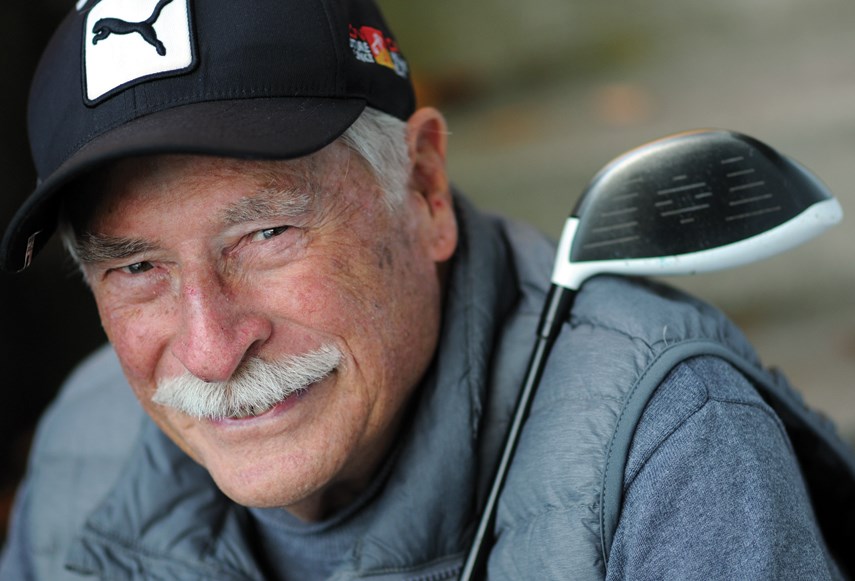On Remembrance Day this year, picture Canada re-created in all its vastness in brown construction paper.
Crumpled piles of paper painted gray and white form the Rocky Mountains, blue paper strips flecked with white are its waterways, pointy rolls of paper painted green are the forests, and plain brown paper represents the Prairies.
“The model was quite good,” Len Lockmuller remembers, “considering we were only about seven years old when we made it.”
He’s recalling some 80 years ago to a class geography project at school in England. “It lit a dream in my mind, even then, to see Canada for myself,” he says.
The year that Len’s class built their version of Canada, was a good year for his family. It was 1938. His father, George, had regular work as a carpenter, and planted a garden at their new home in Dagenham. The house was newly built and “warm,” Len remembers, “with gas fires in the bedrooms, and warm because we were a loving family.”
At school, Len was one of only two in his class who passed the exam that opened the door to an academic, rather than a technical, education, a significant advantage for a boy from a working class family. That door closed when the Second World War changed everything. It wasn’t until years later that other doors would open for Len and young men like him.
In the early days of the war, Len’s father was set to building pill boxes and tank traps as defense against invasion by the Germans. He was away frequently on mysterious assignments, leaving his wife, Evelyn, to hold the fort at home. His garden was displaced by an Anderson shelter, an annoyance when it was installed, but a welcome retreat when the German bombers came.
Len and his brothers – George, two years older and Roy, five years younger – were too young to serve in the war, but the home front experiences they endured – bombs and their aftermath, rationing, evacuation – left their mark.
Len was evacuated three times during the war. The first time, Evelyn and the boys sailed to Norfolk. “It was like a holiday,” he recalls. “The sun was shining, everyone was singing and having a lovely time.” But this was the Phoney War, and after a week or two of peace and quiet, Evelyn brought her boys home.
The real war began in 1940. During the Battle of Britain, Len and his pals would hike to the airfield at RAF Hornchurch to count Spitfires and Hurricanes taking off across the Channel, and those that returned.
The next evacuation was to Somerset, in the west of England. There Len and his brother George remained for almost two years, to the best of his recollection.
Len does remember carrying his suitcase and gas mask, and the crowded trains. He recalls the challenges of adjusting to different ways of life among strangers, and the school classrooms, already full, making room for the new arrivals.
One day, the letters from home stopped. Their house had been bombed and no trace of George, Evelyn or Roy was found. The good news that the family survived arrived about six weeks later, a long time in the lives of two young brothers.
German V-1 flying bombs prompted Len’s third evacuation, north to Durham County, this time with brother Roy. “They were so fast,” says Len, “the sirens couldn’t warn us. We were safe as long as we could hear them whistling through the air.”
When his education, and then the war, came to an end, Len deferred his national service to apprentice as a carpenter. In 1951, at the age of 20, he reported to the Tower of London to begin his two years with the Royal Fusiliers. The following year, the regiment, including newly trained wireless operator Cpl. Lockmuller, sailed for Korea.
Once Len was demobbed in 1953, he set out to realize his dream of seeing Canada. Settling in Toronto, Len worked as a carpenter until, on the strength of his technical training, he went to work for Bell Canada.
In 1965, a family man by then, Len moved west, through the forests, across the Prairies and over the Rocky Mountains to a new job with B.C. Telephone Company, and a new home in North Vancouver.
A young man whose world was upset by one war, and re-ordered by another, had found safe harbour and a bright future in a new world.
“To me,” says Len, “British Columbia really is Canada, the Canada of my imagination.”
Laura Anderson works with and for seniors on the North Shore. Contact her by phone at 778-279-2275 or email her at [email protected].



